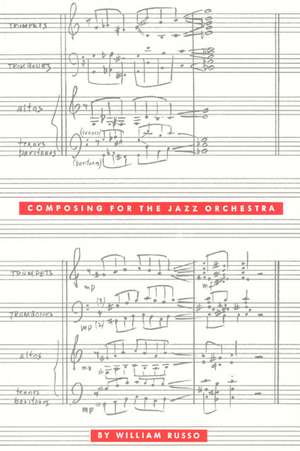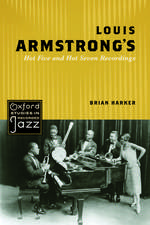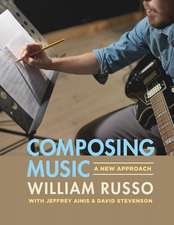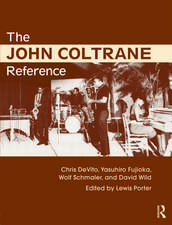Composing for the Jazz Orchestra
Autor William Russoen Limba Engleză Paperback – 15 sep 1973
"Although it will be of primary interest to those who are engaged in composition themselves, [this] book is also recommended for readers who may wish to gain further insight into just what makes jazz composition so different from traditional approaches."—Malcolm Bessom, The Music Magazine
Preț: 227.52 lei
Nou
Puncte Express: 341
Preț estimativ în valută:
43.54€ • 45.29$ • 35.95£
43.54€ • 45.29$ • 35.95£
Carte tipărită la comandă
Livrare economică 14-28 aprilie
Preluare comenzi: 021 569.72.76
Specificații
ISBN-13: 9780226732091
ISBN-10: 0226732096
Pagini: 96
Dimensiuni: 152 x 229 x 15 mm
Greutate: 0.15 kg
Ediția:Revised
Editura: University of Chicago Press
Colecția University of Chicago Press
ISBN-10: 0226732096
Pagini: 96
Dimensiuni: 152 x 229 x 15 mm
Greutate: 0.15 kg
Ediția:Revised
Editura: University of Chicago Press
Colecția University of Chicago Press
Cuprins
1. Alphabetical Chord Symbols
2. The Six Types of Chords
3. Elaboration of the Six Types of Chords
4. Basic Harmonic Considerations
5. The Ranges of the Instruments
6. Voicing
7. Close Position Voicing (I)
8. Close Position Voicing (II)
9. Close Position Voicing (III)
10. Open Position Voicing (I)
11. Open Position Voicing (II)
12. Open Position Voicing (III)
13. Non-Chordal Tones
14. Harmonization of Non-Chordal Tones (I)
15. Harmonization of Non-Chordal Tones (II)
16. The Thickened Line
17. The Widened Line
18. Percussion
19. The Double Bass
20. The Guitar
21. The Piano
22. A Preliminary View of the Ensemble
23. The Basic Ensemble Method
24. The Four-Tone Ensemble Method
25. The Percussive Ensemble Method
26. Brass Mutes
27. The Background
28. The Planning of Orchestration
29. Combinations of Instruments
30. Identities
31. Chords Derived from Scales
32. The Progression of Chords Derived from Scales
33. Mixed Voicing
34. Mixed Ensembles
2. The Six Types of Chords
3. Elaboration of the Six Types of Chords
4. Basic Harmonic Considerations
5. The Ranges of the Instruments
6. Voicing
7. Close Position Voicing (I)
8. Close Position Voicing (II)
9. Close Position Voicing (III)
10. Open Position Voicing (I)
11. Open Position Voicing (II)
12. Open Position Voicing (III)
13. Non-Chordal Tones
14. Harmonization of Non-Chordal Tones (I)
15. Harmonization of Non-Chordal Tones (II)
16. The Thickened Line
17. The Widened Line
18. Percussion
19. The Double Bass
20. The Guitar
21. The Piano
22. A Preliminary View of the Ensemble
23. The Basic Ensemble Method
24. The Four-Tone Ensemble Method
25. The Percussive Ensemble Method
26. Brass Mutes
27. The Background
28. The Planning of Orchestration
29. Combinations of Instruments
30. Identities
31. Chords Derived from Scales
32. The Progression of Chords Derived from Scales
33. Mixed Voicing
34. Mixed Ensembles









